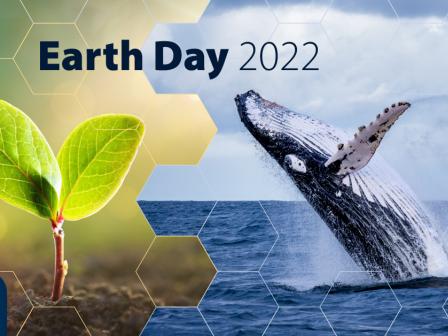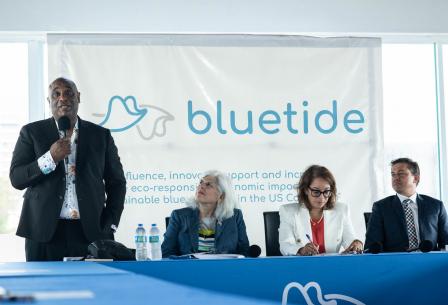
On Earth Day 2022, EDA Continues Its Commitment to Sustainable Development
The Economic Development Administration (EDA) was founded on the eve of the modern environmental movement when, five years before the first observance of Earth Day, President Lyndon Johnson signed into law the Public Works and Economic Development Act of 1965.
Climate Resilience & Sustainability At Our Core
Today’s EDA is at the forefront of sustainable economic development. We recognize that economic vitality, climate resilience, and quality of life are closely linked through the global ecosystem, and that the promotion of innovation and competitiveness, and the creation of good-paying jobs, is inseparably entangled with respect for people and planet.
In 2021, EDA announced a new set of investment priorities that moved environmentally sustainable and equitable development to the forefront of the bureau’s policy and grant-making agenda.
Applicants for new EDA investments are asked to identify planning or implementation projects that help address the climate crisis through the development and implementation of green products, green processes, green places, and green buildings.
This Earth Day, EDA is traveling to Puerto Rico to promote environmentally responsible development happening on the island. Puerto Rico, and its people, are at the forefront of the “Blue Economy,” the sustainable use of ocean resources for economic growth and job creation while preserving our aquatic ecosystems. With support from EDA, a local nonprofit organization is working to do just that.
Our Transformational Work
Since Earth Day 2021, EDA has awarded a score of transformational grants that are making good on our commitment. They include:
- Blue Economy. Through the Build Back Better Regional Challenge, EDA has awarded grants to four different regional industrial clusters focused on growing the Blue Economy. Moreover, each of the organizations supporting these clusters — Washington Maritime Blue, the Southeast Conference (Alaska), the University of Southern Mississippi, and the URI Research Foundation (Rhode Island) — is under consideration to receive an additional $100 million from EDA to support its programs.
- Coal Communities. EDA committed $2.6 million to build and establish a clean energy products manufacturing facility in Harrison County, West Virginia. The construction of this new facility in a hard-hit former coal mining community is expected to create 200 jobs and generate $4 million in private investment.
- Economic Transformation. Nearly $2 million was invested in the Natural Energy Lab of Hawaii to support business retention and growth initiatives at the Hawaii Ocean Sciences and Technology Park, an outdoor demonstration site for renewable technologies. The grant is expected to create 250 jobs and spur $40 million in private investment.
Driving Economic Prosperity

Assistant Secretary Castillo visits Puerto Rico to promote Blue Economy and economic resiliency efforts.
Assistant Secretary Castillo visits Puerto Rico to promote Blue Economy and economic resiliency efforts.
Alejandra Y. Castillo, Assistant Secretary of Commerce for Economic Development, will take part in a christening ceremony for the BlueManta. This state-of-the art research vessel was made possible in part by an $8.9 million EDA grant to the nonprofit consortium Bluetide Puerto Rico in support of the Blue Economy and business development initiatives in Puerto Rico.
“Under the Biden administration, EDA is one of the drivers of a national movement for environmental protection that was sparked a half-century ago,” said Alejandra Y. Castillo, Assistant Secretary of Commerce for Economic Development. “Through targeted investments in innovative programs, we’re proving that good stewardship of our air, land, and sea is an avenue — not an impediment — to economic prosperity.”
These examples are a few of numerous projects and programs supported by EDA that are seamlessly integrating climate and environmental sustainability into the ongoing economic development of communities throughout the United States and its territories.
Learn more about EDA’s investment priorities, including its commitment to environmentally sustainable development, at eda.gov.
